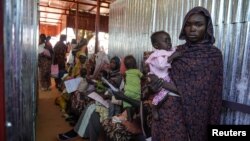United Nations aid agencies warn that an entire generation of children in war-torn Sudan is at risk of malnutrition, disease, and death without urgent action.
According to the U.N Children’s Fund (UNICEF), the World Food Program (WFP), and the World Health Organization (WHO), child malnutrition is being worsened by limited access to nutritious food, safe drinking water, adequate sanitation as well as an increased risk of disease.
All these conditions have been heightened by the 13-month-old war between the Sudan Armed forces and the paramilitary Rapid Support Forces. An estimated 9 million Sudanese have been displaced from their homes, but insecurity and excessive bureaucracy make it difficult for aid agencies to deliver life-saving supplies.
“Mothers and children across Sudan are wasting away from malnutrition. The ongoing war has stripped them of everything they need to survive – food, medical support, and shelter. We need immediate and safe access to deliver the humanitarian assistance that they so desperately need. Without it, this crisis risks becoming the world’s largest hunger emergency,” said WFP Executive Director Cindy McCain in a statement this week.
Parts of Sudan are seeing emergency levels of child malnutrition. About 15.6% of children under age five suffer acute malnutrition in Central Darfur. In ZamZam camp in North Darfur, that number is around 30%.
The statement says malnourishment and disease also exacerbate each other. Sick children become more malnourished, while malnourishment increases the risk of developing sickness. For children who recover in the immediate time span, malnutrition can still have long-term impact on physical and cognitive development.
“Malnutrition is not a one-time crisis. Malnourished children face a lifetime of developmental challenges and ill-health and are also more likely to die from infectious diseases”, said WHO Director-General Tedros Adhanom Ghebreyesus.
For pregnant and breastfeeding mothers, the malnutrition crisis is particularly concerning. According to Doctors Without Borders (MSF), over 33% of pregnant and breastfeeding women in the ZamZam camp are malnourished.
It says they are likely feeding their children instead of themselves, posing danger to the mother and the future child, since as much as 30% of malnutrition begins in utero.
The agencies say that due to conflict, the U.N.’s recent analysis still has data gaps, indicating minimal humanitarian presence in some areas of the country. They say an impending rainy season, beginning in June, will further isolate communities and breed disease. A lean season between harvests, when food runs low, is also approaching.





